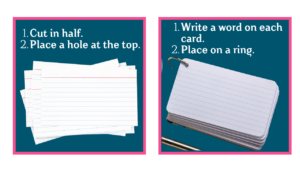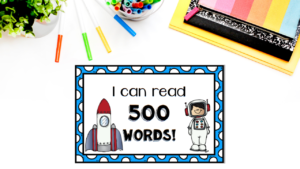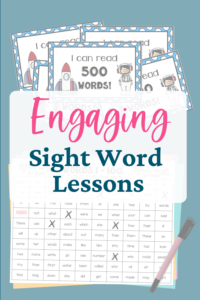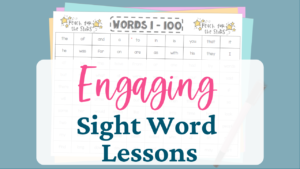5 Essential Components of a Successful Sight Word Lesson Plan
Sight words are an essential part of learning to read and write, but actually teaching them can become tedious! I used to write them on a notecard and have students go off and “practice”. Thinking back on this makes me cringe! Talk about ZERO engagement!
It’s important to have a solid lesson plan in place to help your students master these important words. Here are 5 key components to include in your sight word lesson plan to ensure both high engagement and SUCCESS!
1. Start with a Pre-Assessment
![]()
Before diving into your actual sight word lesson, it’s important to assess your students’ current list of mastered sight words. This will give you an opportunity to celebrate all that they already know and ensure that you’ll focus future time on words they need to learn.
Don’t have a sight word tracking tool yet? We’ve got you covered!
You can download our FREE pre-assessment for Fry Sight Words at the bottom of this page. It’s sure to increase student engagement because it makes the students a part of the tracking progress. They set their own goals and monitor their own progress.
How to use this Tracking Tool:
- Have the students read each word. Cross off the words they know.
- Together, count how many words they already know and celebrate the success – even if it’s just one word!
- Set a goal. Ask the students to choose 3 words they would like to learn next. Highlight those words. Tell them that you’ll be practicing them next time you meet.
- After your meeting, you’ll want to write each word on an index card. I like to cut the index cards in half and put a hole punch in the top of each. Place these in a plastic baggie for future lessons. Place the three words the student chose on a ring for the next lesson.

2. Review Mastered Words
If this is your first time meeting, go to step 3. If it’s not your first time meeting, you’ll want to review the last 5-7 words they’ve most recently mastered. That repeated practice is key to committing them to memory. If they still get them correct, you can get rid of them. If they miss a word, it should be added back to the sight word ring for extra practice.
3. Review Goal and Introduce New Words
Next, you’ll show the students the cards with the words they chose to focus on. This part of the lesson should include no more than 3 words and last no longer than 5-10 minutes. Explain how you’ll practice them that day. It’s important to use a variety of teaching methods when teaching sight words. It could take students many lessons before they master a word. It’s important to mix things up to keep their interest. Here are some ideas:
- Tactile Learning: Did you know that each of your fingertips has more than 3,000 touch receptors? Why not use them? Some tactile learning ideas are:
- Writing with their fingertips in the sand
- Writing with a crayon over a bumpy surface
- Write the word in their own hand
- Repeated Practice: There are so many fun ways students can practice writing their sight words such:
- Rainbow Writing: Write a word in one color. Trace around in another. Repeat 3 more times.
- Write the words in a sentence and illustrate.
- Write on a dry erase board with fancy colored markers.
- Want to really raise the fun level? Try some Sight Word Games such as:
- Sight Word BINGO
- Sight Word MEMORY
4. Celebrate!

What looks like a list of tiny words to us is a monumental accomplishment for our students. It deserves a celebration! That’s why we think it’s important to break the Fry Sight Words into groups of 100. This allows students to have mini-celebrations along the way. We have a special certificate to present to students for each list of 100 words. 10 total! You can find the links at the bottom of this page.
5. Repeat
Repeat this process until the student has mastered all 1000 words!
Here are your FREE resources:
- Fry Sight Words 1-500 Tracker
- Fry Sight Words 501-1000 Tracker (email list members only)
- Fry Sight Words 1-500 Certificates 100-500
- Words 501-1000 Student Certificate (email list members only)
Want the rest? Join the Grace Over Grade email community to get the ENTIRE SET FOR FREE!
Don’t forget to Pin this lesson on Sight Word Lesson Plans!




